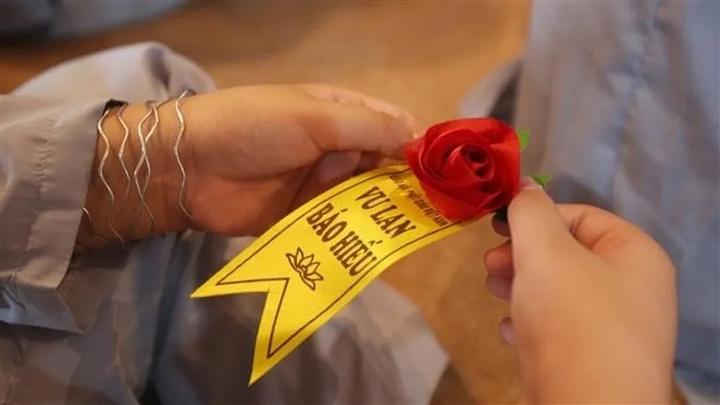The Significance of the Rose Ceremony
The Rose Ceremony during the Vu Lan festival is a way for children to honor and express their gratitude to their parents, grandparents, and ancestors. During this ceremony, Buddhists hold baskets of roses of different colors (red, light pink, white, and yellow) to pin onto each attendee’s garment.

The Rose Ceremony during Vu Lan
According to Master Thich An Dat (Thien Truc Pagoda, District 7, Ho Chi Minh City), Zen Master Thich Nhat Hanh proposed the “Rose Ceremony.” In 1962, the Zen Master was invited to attend a thanksgiving ceremony in Japan to honor mothers. The organizers pinned a white carnation on the Zen Master’s chest to signify that his life partner had passed away. Recognizing the profound significance of this gesture, Zen Master Thich Nhat Hanh incorporated this ritual into the Vu Lan festival. Since then, the Rose Ceremony has become popular and continues to this day.
The “Rose Ceremony” is not only a beautiful cultural tradition but also a reminder to all children. No matter how busy life gets, never forget to show filial piety to your parents and always remind yourself: “If you still have your mother, don’t ever make her cry. Don’t let sadness show in her eyes.”
Why roses, and not some other flower? Roses are chosen for the Vu Lan ceremony because they symbolize gratitude, filial piety, and appreciation. Additionally, roses represent sincere, lasting love, nobility, and a sweet fragrance. Remembering one’s parents and pinning a rose to one’s chest is the most beautiful sentiment and the sacred virtue of filial piety that children wish to convey. During the Vu Lan festival, people of all ages, genders, and walks of life are overwhelmed with gratitude as they receive a rose and pin it to their chest solemnly.
The Special Meanings of the Rose Colors
Yellow Rose
Meaning: For monks and nuns who have renounced worldly life. In Buddhism, yellow represents letting go, liberation, and the color of the path to enlightenment. Pinning a yellow rose to the chest affirms the sacred mission of using the physical body, given by one’s parents, to seek liberation and repay the debt of gratitude to them.
Red Rose
Meaning: For those who still have both their father and mother. This act serves as a reminder that having both parents is the greatest fortune in life. Red roses signify love, warmth, and family unity. Cherish this happiness and never take your parents for granted.
Light Pink Rose
Meaning: For those who have only a father or a mother. People who have lost either their father or mother will pin a light pink rose instead of a vibrant red one. The light pink rose conveys gentleness, compassion, and fond remembrance for the deceased, expressing gratitude to the surviving parent.
White Rose
Meaning: For those who have lost both their parents. The pure white color symbolizes remembrance and the separation of the living and the dead. Pinning a white rose serves as a profound reminder that life is finite. Live honorably so that your departed parents can rest in peace.
The 3 Unforgivable Sins: Ingratitude, Debauchery, and What Else?
“Ancient wisdom reminds us that the heavens watch over us, with the saying, “There are Gods and Spirits watching over us from above three meters.” Every action, every choice we make, is observed by the divine. So, if you believe that “as you do, so shall you reap,” then beware of these three heinous acts that will invite heavy karmic retribution.”
The Joys of Parenthood: 50+ Heartwarming and Insightful Quotes About Children
Children are a parent’s most precious asset, cherished and loved beyond measure. Capturing the essence of this bond, we explore a collection of heartfelt and profound quotes about children. These words will resonate with parents, offering a beautiful reminder of the joy and wonder that children bring into our lives.





































